Far from home, far from safe
This story is part of a larger project by The San Francisco Chronicle and The Imprint and was co-reported by Joaquin Palomino of the Chronicle and Sara Tiano of The Imprint. Reporter Cynthia Dizikes was a participant in the 2019 Data Fellowship, a program of the Center for Health Journalism at the University of Southern California’s Annenberg School for Communication and Journalism.
Her other stories include:
Amid abuse reports, Sequel-run facility that treated California children will close
After abuse probe, another Sequel-run program that housed California youth will close
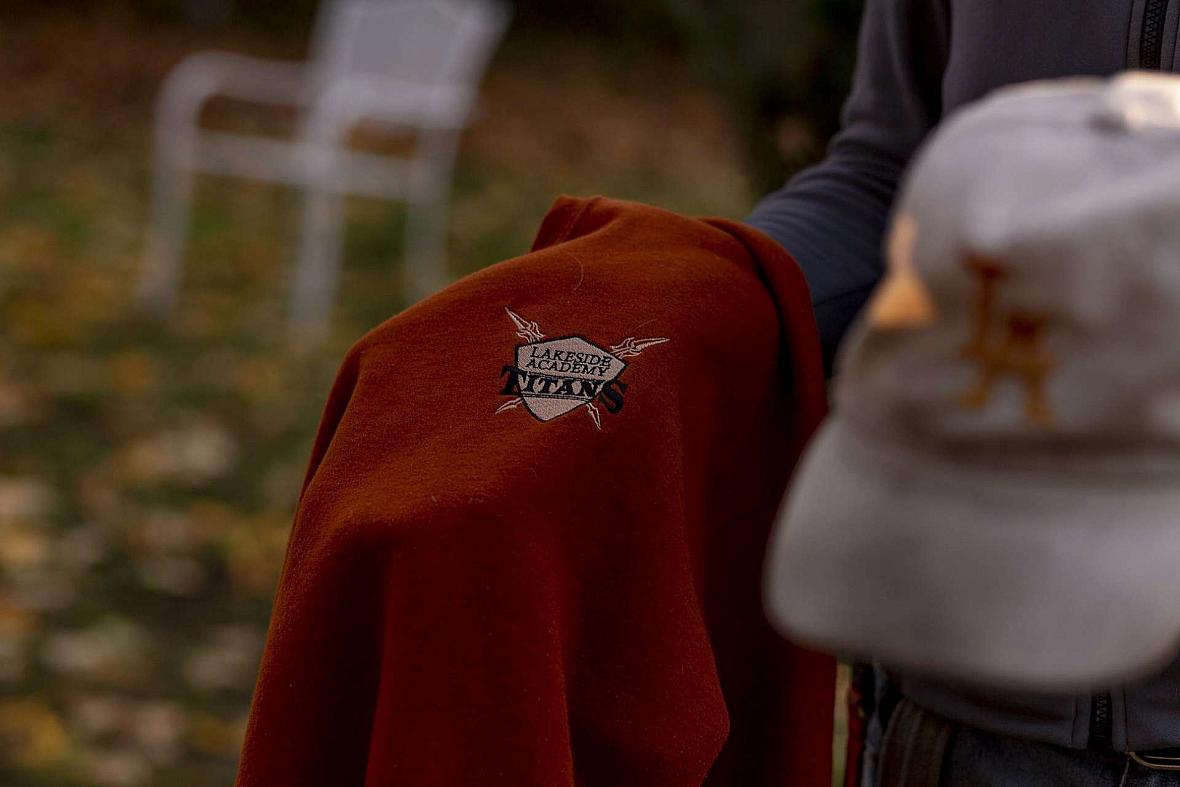
Michael still has a Lakeside Academy hat and sweatshirt from his time at the facility.
Sylvia Jarrus, Special to The Chronicle
A private plane with dozens of shell-shocked teenagers aboard touched down in California's Central Valley.
They were home now, evacuated from the chaos at Lakeside Academy.
Run by Sequel Youth & Family Services — a for-profit, $450 million company backed by Bay Area investors — Lakeside had promised to put the boys “on a pathway to lead healthy and successful lives.”
Instead, the teens, sent to the Michigan facility by California judges, quickly learned they had landed in a place where children said staff choked, hit and slammed them to the ground.
On April 29, the danger turned deadly when seven employees piled atop a 16-year-old boy who had thrown bread in Lakeside’s cafeteria, suffocating him as he cried out, “I can’t breathe,” according to surveillance footage and a civil lawsuit. Cornelius Fredericks died of cardiac arrest two days later.
In the aftermath, brawls erupted and residents ran away. Dozens of children at the California-certified campus in Kalamazoo tested positive for the coronavirus before Gov. Gavin Newsom’s Office of Emergency Services ordered the $200,000 flight that brought them home on May 9.
At the time, one-third of the roughly 120 children at Lakeside were from California. But they should never have been there in the first place.
California officials have sent more than 1,240 boys and girls to Sequel-run facilities in the last six years to receive help for mental health and behavioral issues despite state laws that forbid sending youth to for-profit residential programs, a San Francisco Chronicle and Imprint investigation has found.
At these institutions in Michigan, Iowa, Wyoming, Arizona and Utah, the teenagers, who were disproportionately Black, suffered everything from broken bones to sexual assault at the hands of employees, records show.
"Sometimes, despite our best intentions, we do not live up to our high standards. But there are also many, many successes at Sequel — and we will continue to find our purpose, energy and passion in the stories of those we will help, while working hard to improve in areas where we fall short."
- Sequel Officials
At Lakeside and another Sequel program in Michigan, Starr Albion Prep, children said they were physically and psychologically abused by youth counselors and supervisors, according to investigations by Michigan officials.
One girl, in echoes of the pleas preceding Cornelius’ death, cried that she couldn’t breathe as Lakeside staff dragged her face across the floor, a fellow resident told Michigan Health and Human Services investigators. The girl was treated at a hospital for a rug burn on her temple. Investigators concluded that staff members had acted inappropriately and failed to get the resident prompt medical care, both licensing violations.
At Starr Albion Prep, investigators found that staff members held down a boy during a violent emotional outburst. An employee was suspended after investigators said his actions may have given the boy a concussion. The teen told a facility nurse, “I was seeing stars and my vision went black.” The facility was cited for violating state licensing rules related to restraining children and ordered to write a corrective plan within 15 days.
Colby Jarrell, a 19-year-old from San Bernardino County who left Lakeside in August 2019, said in an interview that staff members caught him trying to run away on his third day. They repeatedly slammed him to the ground, he said, leaving him with back pain so severe he could barely walk for months.
“They f— you up,” he said, “so you don’t try again.”
California spends millions of taxpayer dollars each year to send its most vulnerable children to out-of-state facilities, with the goal of getting them the treatment they urgently need. These young people have been removed from abusive and unsafe homes, charged with crimes and, in some cases, sexually trafficked.
Helping these children with issues ranging from substance abuse to post-traumatic stress can be the difference between turning their lives around or allowing them to spiral deeper into mental health crises and the justice system.
California law requires residential treatment programs to be “organized and operated on a nonprofit basis.” The goal is to ensure top-notch treatment and keep financial incentives from diminishing quality of care. Lawmakers established the provision in 2016, recognizing that profit can be a perverse incentive in the child welfare industry, creating cost-cutting pressures on everything from staff pay to food quality.
Despite the state’s mandate, The Chronicle and The Imprint found that the California Department of Social Services certified eight privately run Sequel residential facilities between 2015 and 2020 that housed about half of the California children sent out of state. County probation and child welfare officials typically choose from the list of state-approved programs when they recommend to a judge that a child be sent to a facility.
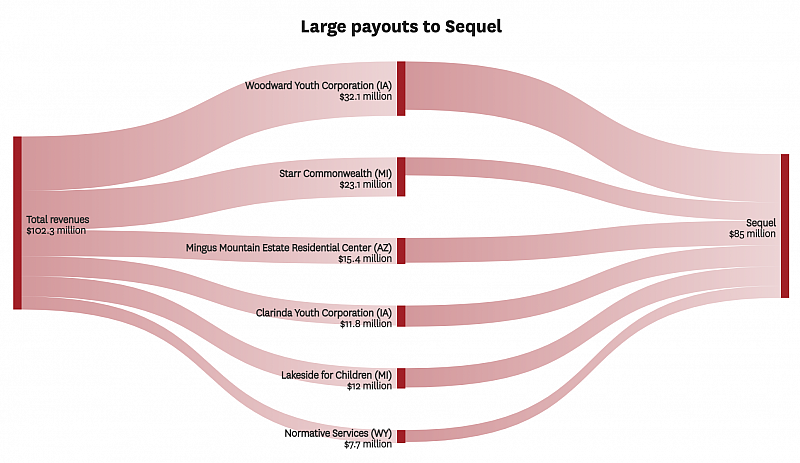
Though these treatment centers are legally organized as separate nonprofits, they send a combined 83% of revenue back to Sequel to “manage and operate” the campuses. This practice has allowed Sequel to skirt California’s mandate that the campuses be nonprofit, and collect public funds that, as a for-profit company, it alone would not otherwise be eligible to receive.
Kim Johnson, director of the California Department of Social Services, declined to be interviewed for this story.
Nevertheless, on Nov. 19, reporters sent the social services agency eight pages of detailed questions based on the findings of this investigation, including questions that specifically concerned Sequel-run institutions with California teens. On Wednesday, three weeks later, Johnson said in a statement that the state was bringing every child home.
The department, Johnson said, planned to decertify all out-of-state facilities, effectively ending the practice of sending foster children and teens adjudicated for crimes out of California. As of Wednesday, 116 of the state’s children were in such placements.
Agency officials said they could not comment on individual cases of alleged abuse or mistreatment. They defended their use of Sequel-run programs, saying it is common for a for-profit company to “establish and support” nonprofits and that these relationships are regulated and overseen by the U.S. Department of Treasury and the IRS.
However, they said all of the programs used by California, including those run by Sequel, had violated the state’s licensing standards, including rules concerning when it is appropriate for staff to place hands on children. The agency stated that its recent decision to end out-of-state placements was caused, at least in part, by the death of Cornelius Fredericks at Lakeside.
“The Department has re-evaluated all out-of-state facilities and found them lacking," Johnson said. “Over the next 45 days, Counties will bring these youth back to California and identify a new setting that meets their needs.”
The department officials did not explain why they had continued to certify Lakeside and other Sequel programs despite years of documented abuse and maltreatment.
“California put children into places that had extensive track records of harm; that in itself is a tragedy,” said Jennifer Rodriguez, executive director of the Youth Law Center in San Francisco.
The organization had threatened to sue California this summer over its use of out-of-state residential treatment programs, Rodriguez said. “Those kinds of experiences, they impact you for the rest of your life,” she said.
Seeking to understand California’s relationship with Sequel, The Chronicle and The Imprint reviewed thousands of pages of police records, financial filings, lawsuits and incident reports from licensing officials in five states. Reporters interviewed dozens of former residents, staff members and youth advocates who either experienced the conditions at the facilities firsthand or have been tracking them for years.
Since 2017, these records show, child welfare officials in California and other states have investigated hundreds of alleged violations or deficiencies at the facilities. Of the alleged violations reviewed by The Chronicle, more than 75% resulted in state authorities confirming that violations occurred.
At least 70 investigations involved allegations that staff members hit, kicked or sexually assaulted residents, or placed them in improper or dangerous restraints. The true number of complaints and violations is likely higher because some states provided only limited information.
Jasmine Murray-Thomas and her 3-year-old son, Jeremiah Micai Thomas, outside Jeremiah’s school in Daly City. As a teenager, Murray-Thomas was sent to two residential treatment programs outside of California operated by Sequel Youth & Family Services. Carlos Avila Gonzalez, The Chronicle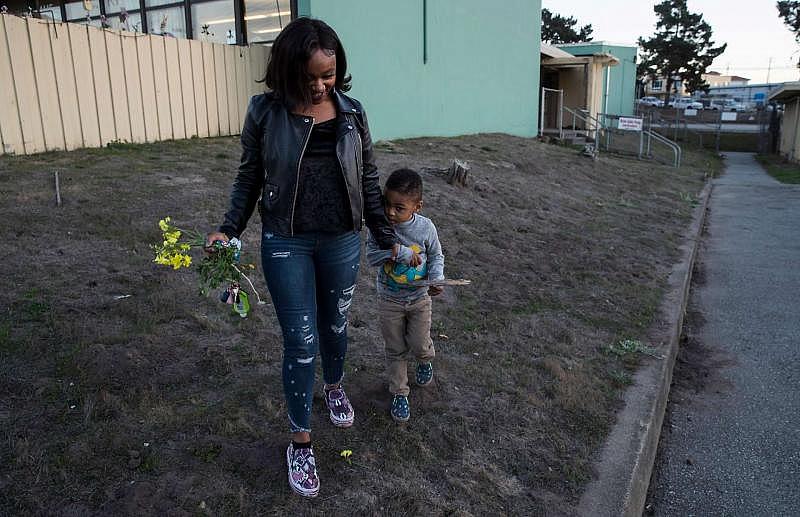
Sequel representatives declined repeated requests for an interview.
In an emailed statement sent by a crisis management director at a public relations firm, Sequel officials said it is common for nonprofits to contract with for-profit companies. Sequel officials said their residential treatment programs have increased staff training and oversight and are phasing out the practice of physically restraining children.
“Sometimes, despite our best intentions, we do not live up to our high standards,” Sequel officials wrote. “But there are also many, many successes at Sequel — and we will continue to find our purpose, energy and passion in the stories of those we will help, while working hard to improve in areas where we fall short.”
To be sure, a great many children have attended Sequel treatment programs without experiencing abuse. In interviews and in licensing records, former residents said the facilities gave them space to break out of harmful patterns and that many employees were genuinely caring.
Jasmine Murray-Thomas embraces her son, Jeremiah Micai Thomas. Carlos Avila Gonzalez, The Chronicle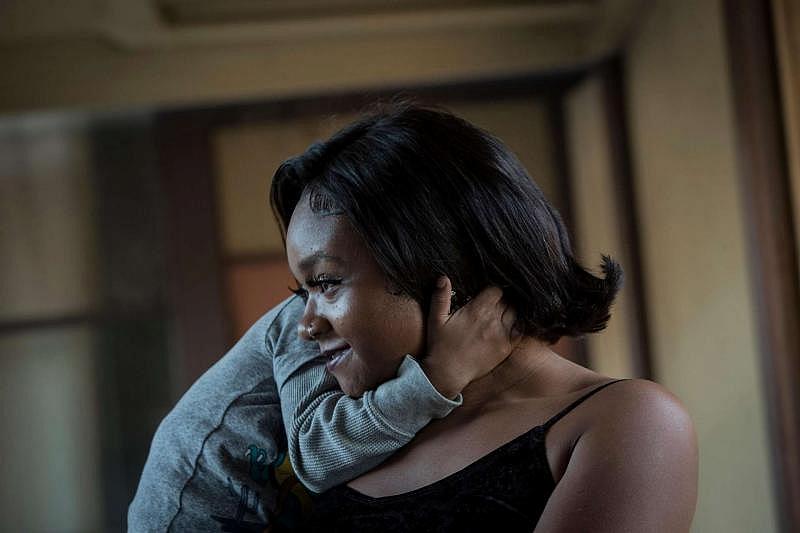
“I was rebelling against authority, I was doing whatever I wanted to do,” said Jasmine Murray-Thomas, a San Francisco resident who was sent to two Sequel campuses between 2012 and 2014. “The programs gave me the structure I needed. They showed me different ways to channel that unruly energy I had.”
Murray-Thomas’ experience was not entirely positive. She said she was constantly “on her toes” trying to navigate a tense environment where residents regularly had emotional outbursts.
Four Sequel-run homes used by California, including Lakeside, shut down or temporarily halted admissions in 2019 and 2020 following abuse reports and licensing violations. At least five states — now including California — have recently severed ties with Sequel.
Yet youth advocates and lawmakers said they were shocked that California had allowed children to be sent to Sequel programs in the first place.
State Assembly member Mark Stone, a Democrat from Santa Cruz who authored legislation to overhaul residential care for troubled youth that included the nonprofit requirement, said in an interview that he was not aware of Sequel’s financial relationship with homes like Lakeside Academy.
A bedroom inside Sequel’s Clarinda Academy in Iowa. Tina Pinedo, Disability Rights Washington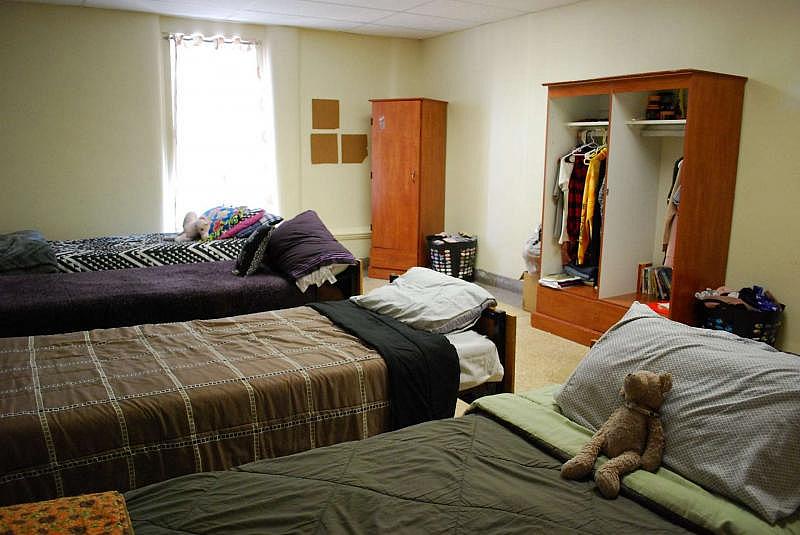
Told of the arrangement by a reporter, he said it was “astonishing” that a for-profit company was running facilities treating California youth — and thwarted the purpose of his reforms. “That’s a serious, serious problem,” Stone said.“You’re making money on the backs of troubled children,” said David Roush, who investigated and monitored abusive practices for the U.S. Department of Justice from 2009 to 2017.
Allegations of severe abuse have continued through this year at Sequel facilities that housed California children.
As recently as July, police in the city of Clarinda, Iowa, were investigating a report that a 31-year-old man committed statutory rape at Sequel’s Clarinda Academy, and a separate report that a teenager forcibly sodomized another teenager, law enforcement records show. No charges have been brought in the cases. Sequel didn’t provide information about the cases or about any specific allegations of abuse at its facilities.
This year at a Wyoming program called Normative Services, investigators with the state’s Department of Family Services found that staff members dragged a student across a floor by his legs, and slapped and choked residents. In each case, Wyoming officials found licensing violations and the employees involved were either fired or quit.
The killing at Lakeside still haunts its witnesses. Sara Lopstain of Sacramento said her son was sitting so close to Cornelius the day counselors pounced on him in April that he heard his friend cry for help. Since coming home, he has been withdrawn and constantly on edge, tensing at loud sounds and quick movements.
“My son was across the United States — it’s not like he was two, three, four hours away — and there was no one around to help him,” Lopstain said. “He used to be a normal teenage kid. But they damaged him.”
II.
Jay Ripley was well-known in the business world as a former Jiffy Lube International executive when he co-founded Sequel Youth & Family Services in 1999.
Ripley was drawn to the multibillion-dollar behavioral health field after visiting Pennsylvania’s Glen Mills Schools, then considered the gold standard of reform schools for foster children and teens in the criminal justice system. Along with Jiffy Lube founder Jim Hindman, Ripley saw a business that could help troubled young people, he told a gathering of Baltimore business school students in 2015.
He also saw a way to make a lot of money.
“They opened up their financial statements to us,” Ripley said in the video-recorded session, describing his amazement when he realized Glen Mills had so much extra cash that it spent $1 million to put a drainage hump on its football field. “And I’m like, ‘Jim, I think this is a good business.’ ”
“It’s really like drinking from a fire hose,” Ripley told the students, describing the demand for residential programs.
"It’s fine for for-profit companies to chase dividends for their shareholders. But when your product is the care, welfare and well-being of our children — not fine."
- State Assembly member Mark Stone
That same year, California officials launched a sweeping effort to scale back the state’s use of group homes for kids.
The research was clear: Housing hundreds of vulnerable young people together in facilities staffed with low-wage, high-turnover shift workers only served to deepen childhood trauma. The vast majority of these children, no matter how troubled, were most likely to thrive in family homes, according to a growing consensus among government officials, advocates and scientists studying the adolescent brain.
Stone’s 2015 reform bill drastically restricted California’s use of group homes for children in the foster care or juvenile justice systems. The young people, whose care is legally entrusted to the state, were to be sent out of California only when they required treatment for mental health needs or behavioral challenges and there were no other options in-state.
Carroll Schroeder, who at the time led an organization representing group homes, called the bill “a once-in-a-generation opportunity to get foster care right.”
Cleanup bills that followed drew on a 1990s statute specifying that residential group homes had to be run as nonprofits, an attempt to ensure that the mission would be quality therapeutic treatment, not returns for investors.
“It’s fine for for-profit companies to chase dividends for their shareholders,” Stone said in a recent interview. “But when your product is the care, welfare and well-being of our children — not fine.”
Yet since the passage of the reform bill in 2015, Sequel-run programs were successful in securing contracts with counties throughout California.
As a private company, Sequel is not legally required to publicly report how much money it receives from various states. But in a 2017 investor presentation, Sequel disclosed that California entities had paid the company about $17 million in the previous year, one of the highest amounts of any state.
By that time, Sequel was running 44 programs, including residential treatment programs and community-based services, for roughly 9,000 “clients.” Young people could stay in residential programs for periods ranging from a few months to more than a year. The campuses housed anywhere from a few dozen to hundreds of children in dormitories with shared cafeterias and on-site schools.
The young people who Sequel serves are among the most challenging to care for, according to child welfare authorities: children who have habitually run away, or who have been kicked out of other programs for acting out in dangerous ways. In California, a team typically composed of probation officers, social workers and therapists recommend state-approved treatment programs to a judge, who then signs off.
“Youth that end up in these facilities are youth that absolutely frustrate and challenge the daylights out of individuals and systems,” Roush said. “They are youth where there are few workable alternatives.”
Sequel sought to be that alternative. And true to Ripley’s original ambitions, the company became quite successful. In 2016, its top executives made as much as $550,000 in salaries and bonuses, while Ripley took home about $104,000 each month as a founder’s fee, according to a Securities and Exchange Commission filing.
Sequel’s ascension caught the attention of Palo Alto-based Altamont Capital Partners, which acquired a majority stake in the company in 2017, adding to its diverse portfolio that includes Planet Fitness and Billabong. Altamont Capital, which does not appear to be involved in the management or day-to-day operations of Sequel programs, did not comment for this story.
In a statement to The Chronicle and The Imprint, Sequel representatives denied that their company put “profits before care.”
“However, we also fundamentally believe that the quality of care we provide directly correlates to good business outcomes in the long term,” they said.
"I have been doing this work for 40-plus years and I have seen all kinds of unethical, illegal, stupid things that nonprofits have done. But I have never seen shell nonprofits like this before. I feel like Sequel has deceived California."
- Laura Otten, executive director of the Nonprofit Center at La Salle University in Philadelphia
That California has relied on Sequel’s treatment programs stems in part from the state’s failure to fully implement its lofty reforms meant to phase out group homes, including out-of-state facilities.
Each year between 2015 and 2019, at least 580 to 690 young people landed in out-of-state treatment programs hundreds of miles from home, according to state records. In a one-month snapshot of placements, from July, Black children represented about 33% of those sent out of state, despite making up 20% of foster youth and roughly 5% of all children in California.
At the Sequel-run facilities, the nonprofits hold the licenses, while sending a substantial share of public dollars back to Sequel, which designs and runs the programs and hires staff, according to nonprofit experts who reviewed the treatment program’s most recent public financial reports. Meanwhile, Sequel deploys its national marketing team to court public officials, sell its services and fill beds.
Seven nonprofit treatment programs recently used by California paid Sequel nearly $85 million to run their facilities in recent years, or about 83% of total revenue.
In statements to reporters, the nonprofit boards of these Sequel-managed facilities said they do more than hold the programs' licenses. They said the local boards provide oversight of the facilities and that their-longstanding partnerships with Sequel have allowed them to grow and provide better care for youth.
“Over the years, there have been bumps in the road but Sequel has always been responsive to any issues or concerns from the Board,” said Vernon Kalkman, the president of Normative Services’ board. “Our nonprofit’s primary reason for its existence relates to using its facility and resources to help troubled youth get on the right path and become productive members of society.”
Laura Otten, executive director of the Nonprofit Center at La Salle University in Philadelphia, reviewed the nonprofits’ financial reports. She said that while the business relationship is not illegal, the arrangement prevents the public from examining how Sequel has spent hundreds of millions of dollars that it has received from states because for-profit, private companies are not required to disclose that financial information.
“I have been doing this work for 40-plus years and I have seen all kinds of unethical, illegal, stupid things that nonprofits have done. But I have never seen shell nonprofits like this before,” Otten said.
“I feel like Sequel has deceived California.”
III.
Kayla was anxious as she made her way up a winding desert road last October.
The 15-year-old girl from Marin County was being taken by SUV to Mingus Mountain Academy, a Sequel-run treatment program for teenage girls in Prescott Valley, Ariz. A judge had sent Kayla to the facility after a run of trouble: First she took her mother’s car without permission, then she spent five months in juvenile hall after cutting off her court-ordered GPS ankle monitor and running away.
The program promised a healing environment to address Kayla’s risky behavior. But her first weeks at Mingus Mountain, she said, were more dangerous and isolating than anything she had experienced at home. Staff members told Kayla she couldn’t speak in Spanish — her preferred language — and that she needed to ask permission just to talk to other girls, she said in a series of interviews. She also said she regularly saw staff hurt residents.
A counselor gave one of her friends a black eye, she said, and another girl passed out while a staff member held her on the ground. Kayla said the violence was often a response to minor misbehavior — refusing to get out of bed or not obeying commands.
During the period that Kayla was at the program, California officials found that Mingus Mountain staff used “excessive force” during restraints and “derogatory and abusive language towards youth.”
“I was scared and missing my mom a lot,” said Kayla, who is now 16 and whose last name is being withheld to protect her confidential juvenile record.
Kayla’s experience at Mingus Mountain followed a pattern for children in Sequel programs, hundreds of incident reports across five states show.
Three Sequel campuses long used by California — Lakeside Academy and Starr Albion Prep, as well as Red Rock Canyon School in Utah — were shuttered by their home states in 2019 and 2020, due in part to documented violence and abuse.
In July, Arizona’s Department of Health Services ordered Mingus Mountain to halt admissions, citing “significant health and safety risks,” and required the facility to train staff on the use of restraints to subdue out-of-control children. (Mingus Mountain has since reopened admissions.)
"I was scared and missing my mom a lot."
- Kayla, who was sent to Sequel-run Mingus Mountain Academy in 2019
California law allows group care staff to physically restrain residents who present an immediate danger to themselves or others. Authorized techniques at state-certified facilities include holding children’s arms behind their backs and pinning them on the ground. The idea is to get the child through an emotional crisis safely.
But state child welfare officials and a disability rights group found evidence that staff members at Sequel-run homes had restrained children — sometimes for about an hour — following behaviors such as scratching an itch or questioning a directive.
Across the eight Sequel facilities recently used by California, licensing authorities investigated at least 285 allegations of abuse or other misconduct since 2017 — including 70 reports of physical assaults or the use of improper or dangerous restraints, according to records from California, Michigan, Wyoming, Arizona and Iowa.
State licensing authorities investigated the facilities at least 120 times for having insufficient and undertrained staff and for inappropriate employee behavior, including staff writing sexually explicit notes to residents, giving them drugs or cigarettes, and taunting and verbally abusing them.
The level of detail in the public complaint and investigation records varies widely from state to state, with Michigan posting the most comprehensive accounts of every allegation.
In December 2018, surveillance video captured a youth counselor at Lakeside pushing a boy who tried to spit on him, causing the child to “bounce off of the wall” and bruise his face, according to the Michigan Department of Health and Human Services.
The counselor was also seen “grabbing, pushing and hitting” the child during the incident, which began when the boy tried to go to bed early after finding out his father had been sent to prison, staff and residents reported. Investigators found the facility had violated licensing regulations related to staff qualifications and concluded the counselor was “overly aggressive.” The facility fired him.
In January, a teenage boy at Lakeside told Michigan licensing officials that a staff member had picked him up off his bed, slammed him on the ground and punched him — allegations corroborated by another resident who witnessed the incident. The teen, who had marks on his neck after the alleged assault, said he didn’t feel safe at Lakeside because “staff are here to hurt kids.”
State investigators determined that the employee used “inappropriate behavior management techniques,” and required the facility to write a corrective action plan. Lakeside fired the staff member.
“The restraints were abuse, let’s be clear,” said DaeJah Seward, 24, of Sacramento, who was sent to Clarinda Academy in 2012 when she was 16.
While at Clarinda, Seward said she saw staff force a pregnant resident into a seated restraint, jamming the teen’s knees into her swollen belly.
“That was the scariest experience for me,” recalled Seward, who now works with foster youth at a Sacramento law firm. “I was like, ‘Her baby! You all are restraining this girl and she looked like she was about to go into labor.’ ”
DaeJah Seward was sent to Clarinda Academy in Iowa in 2012. She now lives in Sacramento. Paul Chinn, The Chronicle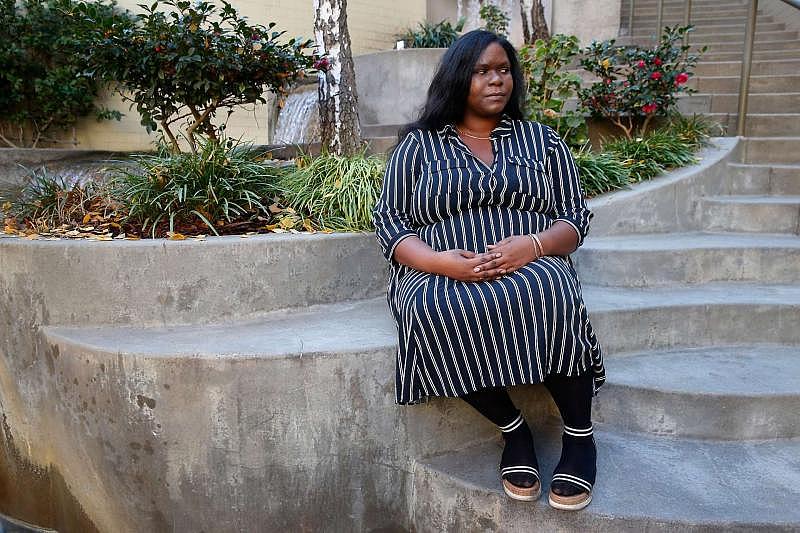
Frontline staff at residential treatment programs do not have an easy job. They work in a challenging environment with traumatized children who often have behavioral outbursts that become violent.
In their statement, Sequel representatives said the company immediately investigates allegations of abuse and that their treatment programs require staff members to go through weeks of training and receive background checks before working with children. The four Sequel facilities certified by California are transitioning away from using restraints, the representatives said, and toward a “trauma-informed approach.”
A number of children who had been restrained told investigators they knew employees were just trying to keep them safe. One girl at Starr Albion Prep said that “it was likely necessary for staff to put her in a restraint to prevent her from hurting anyone,” according to a 2018 incident report.
However, in 2018, Disability Rights Washington published a report describing abusive restraints of children at Clarinda Academy.
The organization, part of a national network that monitors facilities serving vulnerable people with developmental, physical and mental health challenges, uncovered evidence that staff at Sequel’s flagship facility had restrained children until they passed out, broken a child’s eyeglasses, and even taunted a child with a history of engaging in self-harm, stating: “Why don’t you just go and cut yourself?”
In some cases, staff members with histories of harming children were allowed to stay employed, according to the report.
Following the Disability Rights investigation, Iowa’s Department of Human Services reviewed Clarinda’s use of restraints, found no deficiencies and recommended the program keep its license.
“I had never seen anything like this,” said Susan Kas, Disability Rights’ lead investigator. “And I am a person who has been to a lot of places.”
IV.
In grainy video footage from Lakeside Academy’s cafeteria on April 29, Cornelius Fredericks appears to be laughing.
The teenager tosses pieces of bread at the boy sitting across from him. Then, two employees surround him. One pushes Cornelius off his stool. Seven adults press him into the floor for 12 minutes. He stops breathing. Another 12 minutes pass before anyone calls 911 or attempts CPR.
Cornelius later died at a hospital, his death ruled a homicide by “restraint asphyxia.” Three employees have been criminally charged.
"This tragic incident has made clear the need for more placement options for the court to keep youth closer to home"
- Rosie McCool, deputy executive director of the Chief Probation Officers of California, speaking of the death of Cornelius
Quickly thereafter, Lakeside erupted. Boys fought and flipped furniture, and police responded to the facility, according to interviews and news reports. Some of the teenagers ran away, including two from California whom police soon arrested for breaking and entering. Amid it all, a coronavirus outbreak infected roughly a third of the teens on the campus.
“They had basically lost control of the facility; it was shocking,” said Brian Richart, president of the Chief Probation Officers of California. “It all unraveled and devolved so quickly.”
Sequel representatives called Cornelius’ death “heartbreaking” and said the staff that restrained him had violated the company’s policies and training. They said Sequel deployed additional clinicians, trauma therapists and security guards to respond to the tragedy at Lakeside.
Some county probation chiefs said the chaos at Lakeside came as a surprise, because they had no prior indication of troubles at the Michigan treatment program or at Sequel’s other campuses. But the state authorities who certify Sequel-run programs have for years been aware of allegations of abuse.
The California Department of Social Services oversees residential treatment facilities through its Community Care Licensing Division. Agency officials are charged with investigating complaints from California children. When they find violations, their job is to issue citations, demand corrective action and revoke certifications.
The agency is supposed to receive written summaries of every restraint, injury or other serious incident, providing a comprehensive view of conditions at out-of-state facilities.
Until recently, however, the state did not typically share those reports with county officials unless it involved one of their local youth.
In the years leading to Cornelius’ death, state licensing officials had access to reams of maltreatment complaints across the Sequel programs, including at least 20 allegations of physical abuse and improper restraints at Lakeside.
Despite documented injuries, California officials continued to send children to Sequel’s Clarinda Academy in Iowa. Tina Pinedo, Disability Rights Washington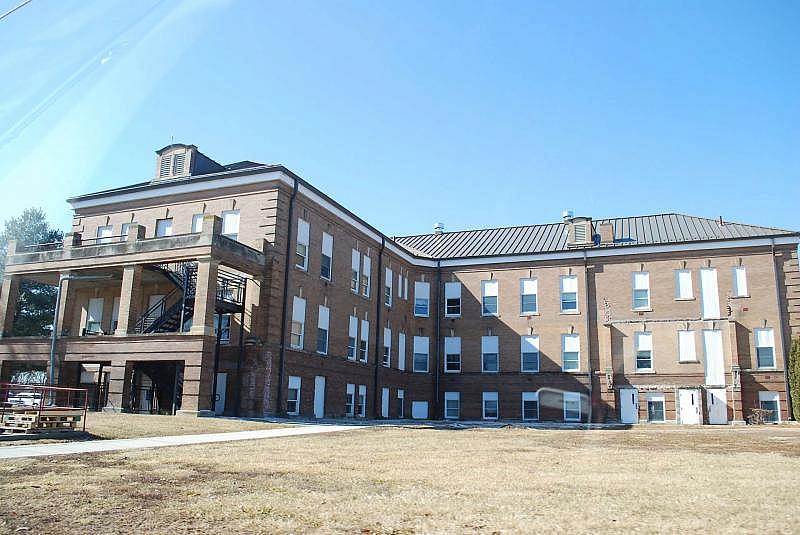
In a 2013 inspection at Clarinda Academy, California child welfare investigators documented serious injuries that children had suffered during restraints. In one case, a staff member broke a resident’s collarbone and then tried to “cover up” any wrongdoing, according to a state report. Clarinda fired two employees following the incident.
California officials recertified the program anyway. The problems persisted.
In 2018, children told Iowa and California child welfare officials that Clarinda staff members had punished them in harsh and humiliating ways, including forcing them to sit for hours facing a brick wall.
This July, California child welfare investigators reviewed video footage showing a staff member pushing a child. The video also showed that a group of employees, including a maintenance worker, then took turns restraining the child for about an hour.
In both incidents, state officials cited the facility for violating regulations related to restraints and personal rights. But California counties sent 24 children to that program through June of this year.
Since 2016, Wyoming and California child welfare officials have investigated more than two dozen allegations of misconduct at Normative Services. In several cases, Wyoming officials found staff members were violent toward children, including one incident that resulted in a felony child abuse charge: A staff member choked, punched and kicked a resident, according to state investigation reports.
In June, the Wyoming Department of Health Services found that an employee had tried to drag a resident down the stairs by his feet for “what appears to be (the) annoying behavior of opening and closing the dryer door,” according to an interview with the child and video footage reviewed by Wyoming investigators.
The employee was immediately escorted off campus, placed on leave and later fired, an investigation report states. Licensing officials said the program followed proper procedures by reporting the incident to law enforcement and child welfare authorities, and did not demand corrective actions.
In March, Normative fired a staff member who had repeatedly pushed down a child who refused to stay seated, before putting his hands around the child’s neck, leaving red marks, according to interviews and reports by Wyoming officials. Licensing officials required an internal “quality assurance evaluation” of the program as well as increased training for staff.
Investigators found the same employee had choked another child the year prior and threatened to kill him. That incident had not been reported to law enforcement and the employee had remained on staff.
Still, California sent 15 children to Normative Services through June of this year.
State officials said that after Cornelius’ death, they reviewed serious incident reports at all 16 out-of-state programs where California children had been sent, concluding that there had been violations in all facilities, including “patterns of improper and/or unwarranted use of manual restraints, which are inconsistent with California licensure standards and are grounds for decertification.”
The state’s decision to stop certifying residential treatment programs only after experiencing a crisis or public scrutiny fits a pattern, youth advocates said.
"People are telling state officials that bad things are happening in these facilities and they chose to do nothing about it. I believe that is criminal, or at least it should be."
- Oregon state Sen. Sara Gelser
For example, California officials certified Glen Mills in Pennsylvania until it was shut down in 2019, following a Philadelphia Inquirer investigation documenting decades of violent abuse. Similarly, California officials kept certifying Red Rock Canyon in Utah, a Sequel-run program, until just weeks before the facility announced it would close in 2019. By then, staff members had been charged with child abuse for allegedly hitting and sexually assaulting residents.
“People are telling state officials that bad things are happening in these facilities and they chose to do nothing about it,” said Oregon state Sen. Sara Gelser, a Democrat from Corvallis who has become a vocal critic of Sequel. “I believe that is criminal, or at least it should be.”
California child welfare officials said Red Rock had not been informing them of incidents and investigations at its facility, as required.
Gelser successfully authored legislation this summer to end the vast majority of Oregon’s out-of-state placements. Then, the senator began pushing other states to sever ties with Sequel. In early August, Gelser reached out to the California Department of Social Services about Mingus Mountain Academy, after she said she received disturbing information about the Arizona facility.
Though the program houses just 70 residents, there had been 136 reported restraints and 110 documented incidents of self-harm in July alone, Gelser said. That same month, Arizona ordered Mingus Mountain to halt admissions until it addressed a long list of safety concerns.
A manager with the licensing division responded to Gelser in an email on Aug. 11, saying the California Department of Social Services had “discontinued” certification of Mingus Mountain in May. The decision, however, was Sequel’s, not California’s. The company “wanted to focus on serving AZ youth,” the manager noted.
In contrast to California’s inaction, Maryland responded to an inquiry from Gelser by saying the state’s Department of Juvenile Services had already suspended admissions to all Sequel facilities.
Arizona would later fine Mingus Mountain for failing to keep a child safe from abuse and maintain a campus “free from garbage and refuse” during a coronavirus outbreak that reportedly infected more than 90 residents — including Kayla from Marin County.
After testing positive in May, Kayla said she and about 10 other girls were quarantined in a gym on the Mingus Mountain campus, where they slept on mattresses on the floor. They were allowed limited phone calls with family, Kayla said, while garbage and food scraps piled up around them, attracting bugs from the surrounding desert.
After two weeks in quarantine, Kayla came back to California. She’d been away from home for more than a year. When she first saw her parents, sister and emotional support dog, she felt calm for the first time in months.
“I had almost forgotten what Marin looked like,” Kayla said.
V.
When the teens from Lakeside Academy landed in California, state officials planned for all 33 boys to be isolated in a quarantine facility in the Central Valley. But local probation departments rejected the proposal, instead bringing the teens back to their home counties to be closer to family.
Boys from Alameda, Marin, Sacramento and San Diego counties were allowed to quarantine at home or in hotel rooms. But authorities in Riverside and San Bernardino counties sent at least eight young people to juvenile halls, where they spent their days alone in bare cell blocks waiting out the virus, according to attorneys and state records.
The crisis in Michigan became an inflection point for some California agencies. Prior to this week’s broad state order to bring all of the children home, four of the six probation departments in counties with children at Lakeside told The Chronicle and The Imprint that they had stopped or scaled back recommending out-of-state treatment programs to judges.
The distant campuses pose too many logistical and financial challenges, the probation chiefs said, and do not align with a broader push for more home-like residential programs for children.
“This tragic incident has made clear the need for more placement options for the court to keep youth closer to home,” said Rosie McCool, deputy executive director of the Chief Probation Officers of California.
While California is now moving to bring back its children, its slow response has had a lasting impact. Some former residents said they still vividly recall the pain and panic they experienced at Sequel facilities. Even children who weren’t abused said they were traumatized by witnessing violence.
Michael, 19, was at Lakeside Academy, a youth facility run by Sequel in Kalamazoo, Mich., in 2019. Sylvia Jarrus, Special to The Chronicle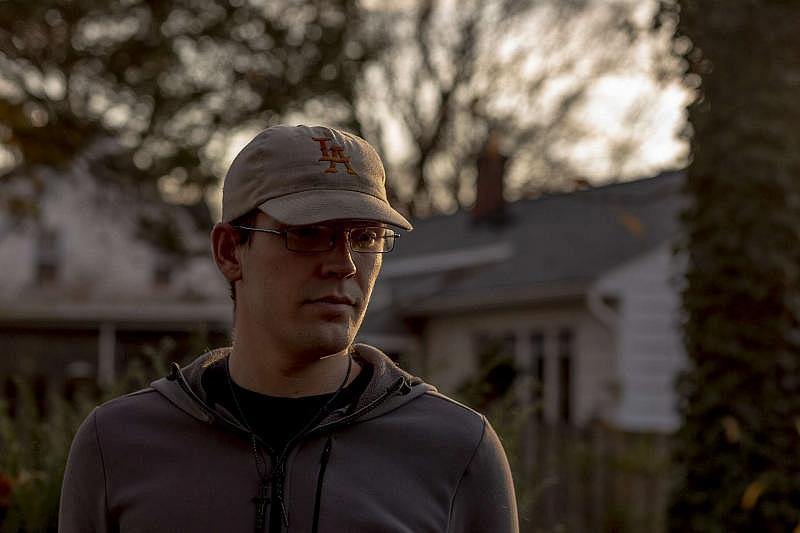
Michael, a 19-year-old from Fontana (San Bernardino County), said he’s had trouble moving on from his time at Lakeside in 2019. He said staff members protected each other and ganged up on students who reported abuse. “Describing it is hard,” Michael said. “I’ve tried to forget about this.”
Jarrell, the 19-year-old from San Bernardino County, said that when he told a Lakeside supervisor that a group of employees had beaten him up, the supervisor asked if he had “learned his lesson.”
When a judge sent Jarrell to Lakeside, the teen didn’t think he needed help. But in retrospect, he said, “I definitely did, but I don’t think I got it.”
A little over a year after leaving the program, Jarrell is living in his car and struggling with addiction.
“Right now,” he said, “I’m definitely not better.”
Sara Lopstain’s son, who was friends with Cornelius at Lakeside, has sometimes disappeared for days on end since coming back to Sacramento.
Michael still has a Lakeside Academy hat and sweatshirt from his time at the facility. Sylvia Jarrus, Special to The Chronicle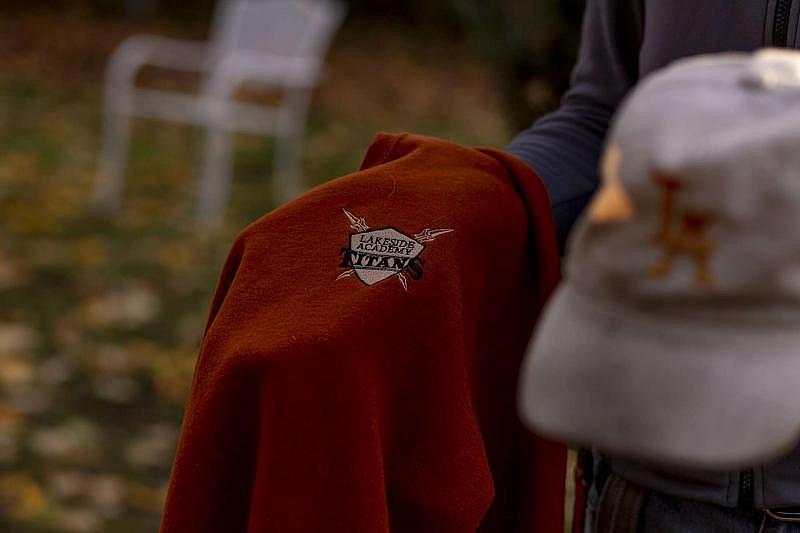
“These kids go through so much hell at the hands of so many adults and so many people in these agencies that are supposed to protect them,” Lopstain said. “If one kid dies, to me, everyone should be charged. Because every single person knew it, and every single person allowed it.”
This story was updated with comment from the president of Normative Services, Inc.’s nonprofit board. This article was written while Chronicle staff writer Cynthia Dizikes was participating in a data fellowship run by the University of Southern California’s Annenberg School for Communication and Journalism.
[This story was originally published by the San Francisco Chronicle.]

